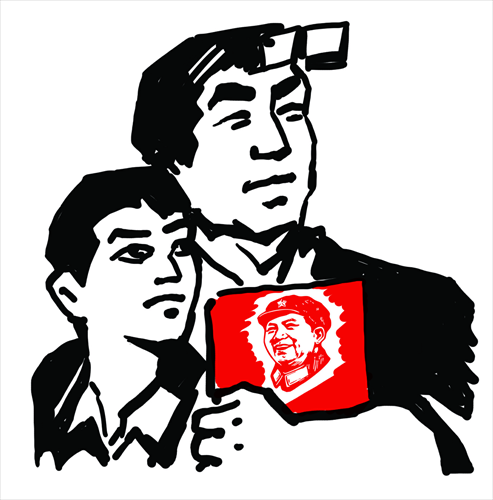Mao Zedong Thought remains relevant

Illustration: Liu Rui/GT
At the 120th anniversary of former leader Mao Zedong's birth, generally four different views on the nonpareil communist leader, his thoughts and performance have become popular in China and throughout the international community at large.
First, some people hold that Mao's merits outweigh his faults. A certain number of progressive people stress that Mao and his thoughts were completely or basically right during the New Democratic Revolution (1919-49) and years after the foundation of the PRC, but went somewhat off the track in the 1960s and 1970s to class struggle instead of adhering to the Marxism-Leninism.
Second, there is a stance that he was 50 percent right and 50 percent wrong. Focusing too much on partial information, such simple-minded people maintain that Mao was basically correct during the New Democratic Revolution but earned more demerits in the stage of socialist revolution and construction. They have drawn this unbalanced view mainly because they exaggerate his deficiencies in economic, political and cultural development during the 28 years before the adoption of the reform and opening-up policy.
Rightists at home and abroad either totally deny Mao's thoughts and accomplishments or overstate his errors and fabricate rumors. They attempt to publicize Western constitutionalism and privatization while negating the CPC and its socialism with Chinese characteristics, with the purpose of interfering into China's socialist development.
Another group extols all Mao's words and deeds, with some ultra-leftists commenting that his thoughts for the socialist revolution and construction were perfect. And they suggest putting in place radical movements like the Cultural Revolution (1966-76) to cope with such social ills as graft, corruption, an increasing wealth gap, demoralization and ideological turmoil that keep popping up in the reform and opening-up era. These leftists have confused the turbulent spasm with the current reform, problems and solutions.
The majority of Chinese identify with the great helmsman primarily because he and the CPC have fundamentally changed China's impoverished situation.
For 20-odd years after the foundation of the PRC, the nation, according to official statistics, enjoyed an annual growth rate of more than 6 percent in GDP, established relatively complete industrial and economic systems, and enormously improved people's livelihood. Most Chinese believe they would have lived in poverty and hardship if not for the New Democratic Revolution led by Mao.
In parallel with this, socialism with Chinese characteristics, though inaugurated in the new era of reform and opening-up, was actually built upon the basic system of socialism that had been launched for more than two decades.
So does Maoism possess practical significance today? I once ran an opinion poll including around 3,000 people and nearly 85 percent of them held a positive standpoint.
To begin with, in terms of Party building and State governance, the socialist path with Chinese characteristics is a scientific inheritance and development of Mao Zedong Thought. And the theory of the primary stage of socialism derives from Mao's idea that socialism is composed of underdeveloped and developed stages.
Maoism also applies to social life. People in Mao's era were called to learn from Norman Bethune, Zhang Side, Lei Feng, Jiao Yulu and other virtuous paragons.
This has partly molded core socialist values in present China and helped curb a variety of malignant phenomena including selfishness, lack of integrity, extravagance and bureaucratism.
From an international perspective, the Chinese people in Mao's era showed sincere support for the efforts by oppressed nations to pursue independence, eliminate colonialism and uproot racism. China thus gained favor from the developing world and socialist nations.
The "Three Worlds" theory developed by Mao is still being practiced by overseas communists and pioneers. Late Venezuelan president Hugo Chavez proposed combining Marxism-Leninism and Mao Zedong Thought with the status quo of Latin American countries.
He was hailed by his people for his spectacular achievements, which also embodies the contemporary value of Mao Zedong Thought.
The author is director of the Academic Division of Marxist Studies, Chinese Academy of Social Sciences. opinion@globaltimes.com.cn